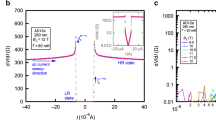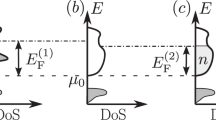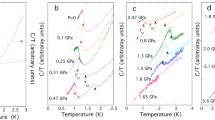Abstract
A SUPERCONDUCTOR in its normal state in a magnetic field can be ‘supercooled', in the sense that the field must be decreased some way below its critical value Hc before the transition into the superconducting state occurs. The explanation of this, originally given by London1, is that a boundary between the two phases has a surface energy, which makes the creation of the first nucleus of the superconducting phase energetically difficult.
This is a preview of subscription content, access via your institution
Access options
Subscribe to this journal
Receive 51 print issues and online access
$199.00 per year
only $3.90 per issue
Buy this article
- Purchase on Springer Link
- Instant access to full article PDF
Prices may be subject to local taxes which are calculated during checkout
Similar content being viewed by others
References
London, H., Proc. Roy. Soc., A, 152, 650 (1935).
Sixtus and Tonks, Phys. Rev., 37, 930 (1931).
Author information
Authors and Affiliations
Rights and permissions
About this article
Cite this article
FABER, T. Creation and Growth of Superconducting Nuclei. Nature 164, 277–278 (1949). https://doi.org/10.1038/164277a0
Issue Date:
DOI: https://doi.org/10.1038/164277a0
Comments
By submitting a comment you agree to abide by our Terms and Community Guidelines. If you find something abusive or that does not comply with our terms or guidelines please flag it as inappropriate.



